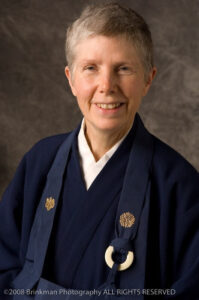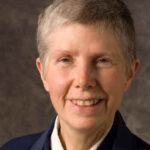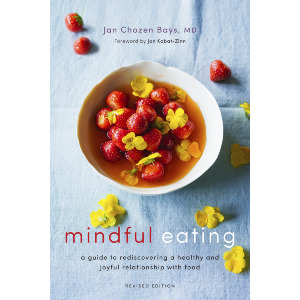An interview on the publication of the expanded edition of her book Mindful Eating: A Guide to Rediscovering a Healthy and Joyful Relationship with Food
By Dave O'Neal
Shambhala: What, in a nutshell, is “mindful eating”?
Jan Chozen Bays: Mindful eating is deliberately paying full attention to what you are eating or drinking, without criticism or judgement.
The last part, “without criticism of judgement,” is very important, since so many people are under constant attack by their Inner Critic about what they are eating. In mindful eating we replace the Inner Critic with Investigation and Curiosity.
S: When the original edition of Mindful Eating (from which the revised edition is adapted and expanded) came out in 2009, it was a big success—why do you think so many readers connected to the book?
JCB: Because diets don‘t work. And inner criticism doesn‘t work. They just make you miserable. People were ready for a new approach.
Mindful attention is a skill we all have. When people read about it in the book, something inside them says, “Yes, I remember this. There was a time when eating was uncomplicated, pleasant, and even fun. I long to go back to that way of eating!” That‘s why the book is subtitled “Rediscovering a Joyful and Healthy Relationship with Food.” This is rediscovering, getting in touch again, with the simplicity of listening to the body‘s wisdom about eating.

S: How did the idea to write Mindful Eating first arise for you?
JCB: I have had two parallel careers, as a physician and as a Zen teacher. In the early days you could not admit to other doctors that you meditated. It was considered weird, and thus I kept these two careers separate. About fifteen years ago I began seeing increasing numbers of overweight and obese children in my medical practice and realized we were in the midst of a serious epidemic. In looking for a solution, I reviewed what we had tried in the past. We had tried diets. The research is quite clear: diets don‘t work and shouldn‘t be inflicted on children. In fact, the best predictor of later eating disorders in women is dieting in preteen and teen years. We tried attacking fat through liposuction and attacking the digestive system through bariatric surgery. Both are very inappropriate for children.
The problem is not food, or fat cells or our digestive system. Food is food (as long as it not processed food-like substances). Fat cells are just doing their job, trying to save us from famine by storing extra calories. And our GI system is just trying to do its job, digesting and absorbing the food we eat. The medical profession wasn‘t doing so well with the problem of people being out-of-harmony with eating.
So I looked to my Zen practice, to mindful eating practices I‘d been doing myself and teaching to my students for over twenty years. Mindful eating is free, is applicable to people of any age, will spread its benefit to other areas of life, can be taught by parents to children, and, best of all, it‘s fun!
The problem is in our minds and heart, in the conditioning and distress we‘ve laid over our natural ability to eat appropriately and enjoy ourselves doing so.
S: What‘s been added to this new edition?
JCB: Everywhere I go, people ask me about mindful eating and children. Grandparents with candy in their pockets, parents who feel guilty about taking their kids to McDonald‘s, everyone wants to know. So I added a chapter on mindful eating and children. If we teach children to eat mindfully, we give them a great gift—a lifetime free of pervasive anxiety and suffering around food.
I also added a section on the microbiome, the amazing universe of microorganisms that live in our gut. There is new research published almost every day that indicates that these tiny being are like another organ, an organ that controls or influences the physical health of many parts of our body and may even affect our mental health. Because the microbiome is different in obese and slender people, people are interested in whether we could take a “pill” of engineered microbes and cure obesity. But nothing in our body is that simple. The system is much more complex than we can imagine.
As we discover more and more about the many functions of the universe of microorganisms within us, when we learn that only ten percent of our DNA is human and the rest belongs to the microbiome, we wonder, “Who is in charge here? And who am I—what exactly is this system I call ‘me’?” And we realize that we need to take good care of those microbes that dwell inside of us, to keep them healthy so that the body they call home and we call “mine” will be healthy, too. Wouldn‘t you be nice to a group of individuals, who, if you didn't take good care of them, could give you diabetes, liver failure, heart disease, Parkinson‘s disease, inflammatory bowel disease, and depression?
S: As you’ve said, you’re a Zen teacher as well as an MD. To what extent is the material in the book, particularly the practices you provide, informed by Zen Buddhism?
JCB: In Buddhism we say, “To live as a human being is to experience suffering.” But the promise that Buddhist practices offer is that the suffering our minds add to ordinary discomforts and challenges is optional.
Mindfulness is a basic aspect of what we call “awakening,” that is, living life with awareness instead of being on autopilot and eating unconsciously. When we step out of autopilot and into awareness, we begin to have choice. My new slogan is “Awareness brings choice, and choice brings freedom.”
Meditation is essential to mindful eating. Only in the open “space” that meditation creates in our busy minds can we see what is actually happening when we feel hungry and while we are eating. For example, if we suddenly feel the urge to eat just a half hour after lunch, we can stop and ask our body, heart, and mind, “You just ate. What's going on in there?” We discover that the body is not hungry, but in the heart/mind we are anxious or lonely. At that moment, choice enters the picture. We can decide to address the sources of those feelings, perhaps by calling a friend. We can also decide to eat, but we can make healthier choices around what to eat and how much. We can eat mindfully, watching if and when the anxiety diminishes. Maybe what will actually make us feel better is a cup of warm tea and a short chat with our best friend.
We can experiment, investigate, and make discoveries about how this system we call “me” actually works. This exploration, these discoveries, give us confidence, a feeling of control-through-understanding, and bring us a simple happiness.
S: What sort of feedback/stories have you received from those who’ve read the book or participated in your Mindful Eating workshops? Anything particularly interesting to share?
JCB: I could fill another book with the amazing stories I‘ve heard from people attending workshops or trainings in Mindful Eating-Conscious Living for professionals. Dieticians and health care professionals from many countries tell me they are tired of handing out diet sheets. They know, and their clients know, that they will not follow them. It's an exercise in mutual futility. The professionals say, “This is the missing piece!” and they enthusiastically take mindful eating back to their patients and clients. Here‘s one story:
A woman took a two-day mindful eating workshop and decided to try just one exercise: slowing down. She chose this because her partner was a slow eater, and it made her impatient and caused tension between them. She came to me five years later and said that just by slowing down she had unexpectedly lost thirty-five unwanted pounds, but, even better, her relationship with her partner had really improved. Now they had time to relax enjoy talking together while eating.
S: After reading the book, one becomes aware that many of the “reasons” why one eats actually make no sense whatsoever. What are the reasons to eat that do make sense?
JCB:
- To feel good inside. This includes knowing the difference between fullness (a volume measurement) and satisfaction (an emotional measurement).
- To enjoy all the flavors, textures, and sounds of eating.
- To feel connected to the life all around us and within us.
- To be healthy in body, heart, and mind.
- To satisfy our need for intimacy, which is the fundamental need of all human beings. Mindful eating cultivates intimacy with ourselves—our bodies, our minds, and our hearts. Unless we are intimate with ourselves, friends with ourselves, we cannot experience satisfying intimacy and connection with others.
S: This all makes eating seem like a profoundly wonderful practice.
JCB: As it is!
$16.95 - Paperback


